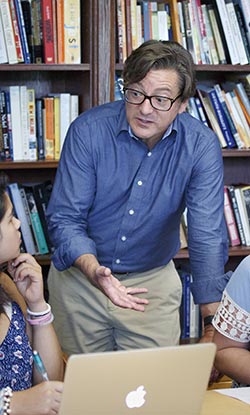 History faculty member Steven Bachelor’s interest in history was sparked in fifth grade when a cousin, who was moving, gave him a collection of Mad magazines that covered the years from 1959 to 1975. “I was captivated by them, because they introduced me to U.S. history from a very satirical point of view, during a time when the U.S. was going through some monumental changes.”
History faculty member Steven Bachelor’s interest in history was sparked in fifth grade when a cousin, who was moving, gave him a collection of Mad magazines that covered the years from 1959 to 1975. “I was captivated by them, because they introduced me to U.S. history from a very satirical point of view, during a time when the U.S. was going through some monumental changes.”
In eighth grade, inspired by his Mad readings, he chose Watergate as his history research topic, much to his teacher’s delight. And this is when the idea began to form that he wanted to “just kind of read and think about history” and to teach it.
“The reason why I think history is so important is in a quote I love by Mark Twain: ‘History doesn’t repeat, but it often rhymes,’ because there are patterns to our behavior as humans that we can recognize over time,” he said. “The problem happens when people put these false distinctions in history, that they use as markers. For instance: This is the modern period. Or this is the pre-modern period. Or this is ancient. Those markers are actually the products of ideology and myth-making.”
Bachelor grew up in Los Angeles in the 1980s, the son of two working-class parents. “I grew up in the midst of a city with a large Mexican presence. But I grew up on the white side of town, and although I had friends who were of Mexican background, when I went to high school, they weren’t there because of districting.” These inequities and what was happening in Central America made Bachelor want to learn more.
“The United States was basically fanning the flames of civil war, driving migrants into the United States, and then condemning these migrants for arriving in the country. In high school, I was already realizing these stories weren’t jibing with what I saw around me,” said Bachelor.
As a first-generation college student, Bachelor was thrilled to attend UCLA, where he formed great connections with his professors and majored in history with a Latin American focus. “The reason why I studied Latin America, and why Latin America speaks so much to me is because there’s an indigenous presence in Latin America that has never been fully eradicated by colonization. And it provides a lot of inspiration for alternative ways of imagining how the world can be, because these are ways of living that existed before the Europeans arrived—non-hierarchical and consensus-based ways of decision-making.”
He then spent time traveling in Mexico and taught in East L.A. for two years before following his dream of working towards a Ph.D. at Yale University. He was interested in “how Mexico’s rapid experiment with industrialization led to not only an increasing gap between the haves and the have-nots in Mexico, but also led to an increasing gap between the haves and the have-nots in the U.S.” He focused his dissertation on how “the automobile industry went from being the producer of the American dream to the producer of the Mexican dream, and eventually the destroyer of both.”
After obtaining his Ph.D., Bachelor took the next traditional step of a tenure-track professor position, but he didn’t enjoy the priority of academic research over teaching. He and his wife were starting a family and he wanted to be an involved parent, so eventually he left to work at a boarding school for students on the Autism spectrum. Bachelor said their son is on the spectrum, so, “it was an opportunity to learn how to teach in a fundamentally different way and to expose me to students whose neurological profiles would be similar to my son’s.”
Bachelor came to Milton four years ago and he loves the teacher/student interactions here. “At Milton, I am encouraged—from departmental leadership to school leadership—to meet students where they are. There’s a genuine commitment to that and there’s a real love for the students here.”
In addition to Modern World History, he also teaches a half-course elective that he designed called The Aztecs to High-Tech: A History of Latin America and the Caribbean in the World. “Each year, it ends up being a little different, because I try to respond to what the students want. Two years ago, many of the students in the class were from the Dominican Republic, so that’s what we spent time studying because the students wanted to know more about their country’s history.”
